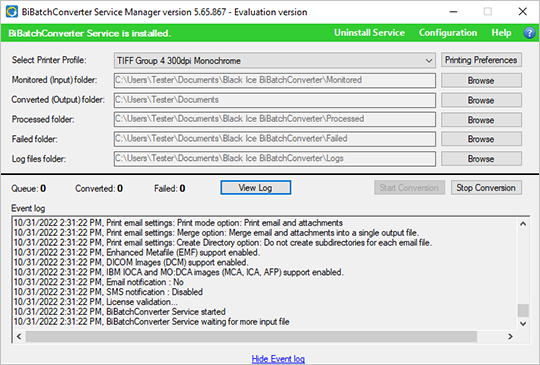The BiBatchConverter Service Manager is a 24/7 service-based document converter that can monitor multiple folders and their subdirectories simultaneously, converting any printable file into editable PDF, Compact PDF, PDF/A, TIFF, Fax, JPEG, PNG, and other formats. It features an intuitive interface for easy configuration and real-time monitoring of document conversions.
The BiBatchConverter Service Manager is part of the BiBatchConverter and the BiBatchConverter Server.
- Installing the BiBatchConverter Service
- Configuration of the BiBatchConverter Service Manager
- Starting the conversion
- Automatic: The service starts automatically when Windows starts.
- Manual: The service must be started manually every time after Windows starts.
- Red: The service is not installed. The Administrator must install it through the BiBatchConverter Service Manager.
- Orange: The service is installed but not running. To activate it, go to Service Settings and click Start Service or use the Stop Service button to halt the service when needed.
- Green: The service is installed, running, and ready for configuration and document conversion.
- Email and attachment – Converts both the email (including From, Sent, To, and Subject fields) and every attachment as separate documents.
- Email only – Converts only the email, including From, Sent, To, and Subject fields. Attachments are ignored.
- Email body and attachment – Converts the email body (excluding From, Sent, To, and Subject fields) and attachments as separate documents.
- Email body only – Converts only the email body. Ignores From, Sent, To, and Subject fields and attachments.
- Email attachment only – Converts only the attachments and ignores the email content.
- The Website name will be the newly created website’s name in the IIS. The website name can be a maximum of 64 characters.
- The Website Port will be the default binding associated with the website. For example: If you use 808 as Website Port, then the website will accessible through the following URL: http://serveripaddress:808
- The Port Number can be between 0 and 65536.
- The Website Path must point to the directory where the web interface files will be stored. The Website Path can be a maximum of 260 characters.
- The Admin User must be a username of an administrator account that will be assigned for the website. This administrator account requires access to the BiBatchConverter Server installation directory.
- The Admin Password must be the password for the provided administrator account.
Benefits of document conversion running the BiBatchConverter Service
The BiBatchConverter Service can run under "Administrator" account instead of under a particular user or System Account. This allows the service to continue the document conversion even after the current user logs off in unattended mode.
This page covers information about the following topics:
Installing the BiBatchConverter Service
When the BiBatchConverter Service Manager is launched for the first time and the service was not installed during the installation process, a red ribbon appears in the user interface indicating that the service is not installed. To install the service, click the Service Settings button.
Please note, if the service was installed during installation, a green ribbon will appear confirming that the BiBatchConverter Service is installed and running. To start or stop the service, uninstall it, or configure the service start mode and startup delay options, click the Service Settings button.
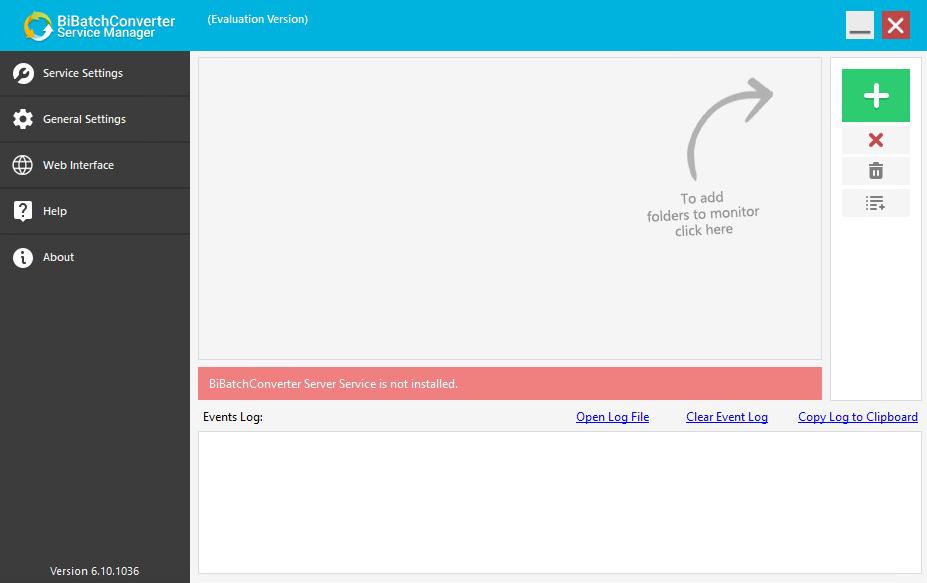
On the Service Properties window, enter the username and password of the Administrator, then configure the Service Start Mode and Startup Delay options as needed.
The BiBatchConverter Service must run under a local administrator account who already once logged in on the computer. The BiBatchConverter Service cannot run under a system account.
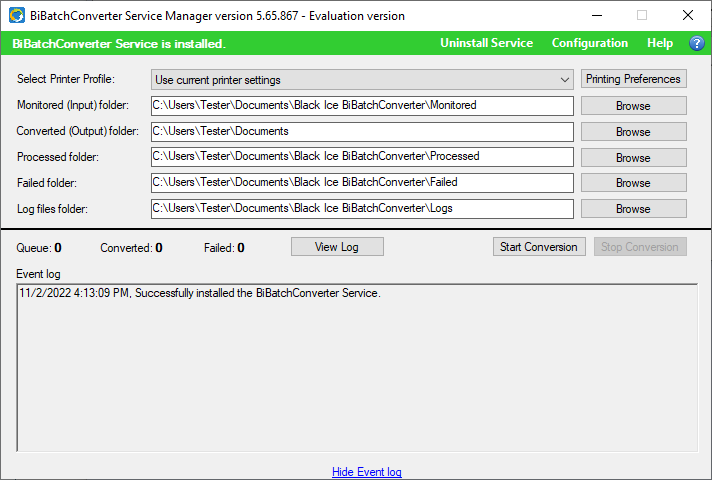
Service Start Mode:
Startup Delay
Specifies the time in seconds to start the conversion process by the service after the service is started. The purpose of the Startup Delay is to make sure that certain required processes used by the service for conversions are started and running before service starts the conversion. The default Startup Delay is 10 seconds.
When the configuration is finished, click on the Install BiBatchConverter Service button. The following window appears if the service was installed successfully.
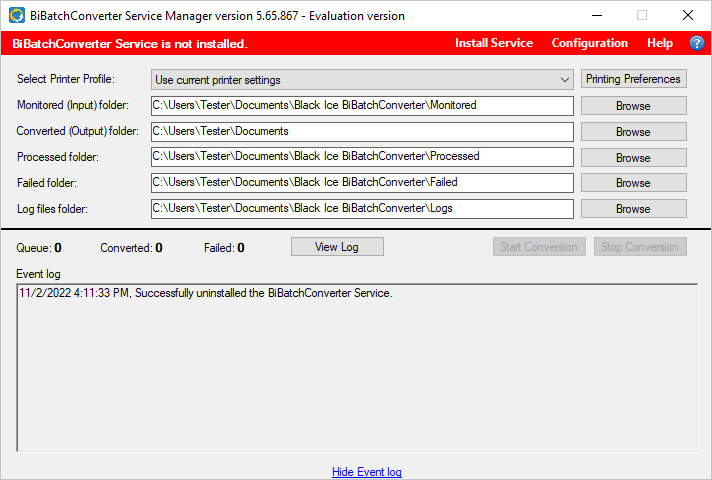
Please click the OK button. The BiBatchConverter Service starts automatically.
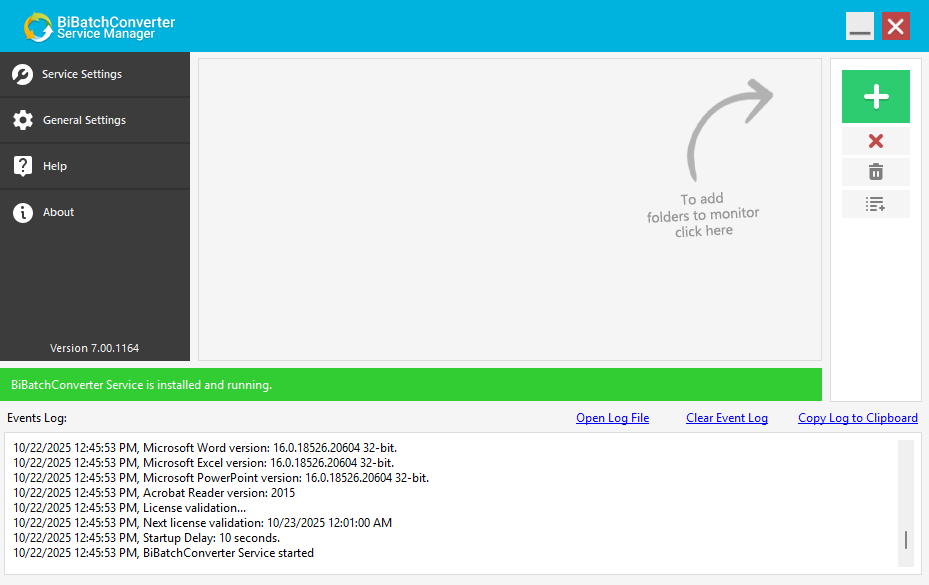
To manually start or stop the service, please use the Start Service and Stop Service buttons on the Service Properties window.
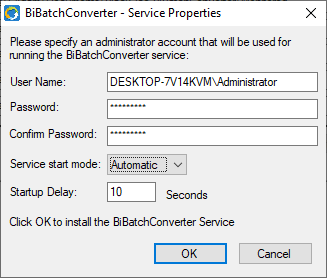
Service Status
On the BiBatchConverter Service Manager user interface, a colored ribbon indicates the current status of the BiBatchConverter Service:
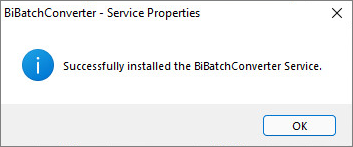
For more information on how to configure folder monitoring and conversion, please refer to the Document Conversion Configuration section of the manual. To read more about how to start the conversion, please see the Starting the Conversion section.
Configuration of the BiBatchConverter Service Manager
The BiBatchConverter Service can monitor multiple folders simultaneously to automate the document conversion process. To configure folder monitoring and conversion settings, the user must create a new task that monitors a specified folder. Multiple tasks can be created, each with its own input and output folders and customized settings. Each task can operate independently and simultaneously, allowing the BiBatchConverter Service to handle diverse conversion requirements across various document types, destinations, and processing rules.
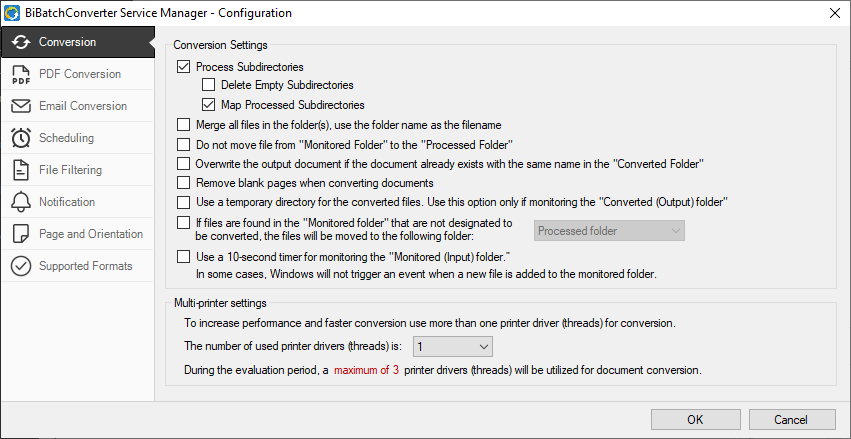
Adding or editing a monitored Task
To create a new monitored task, click the Add Monitored Task... button (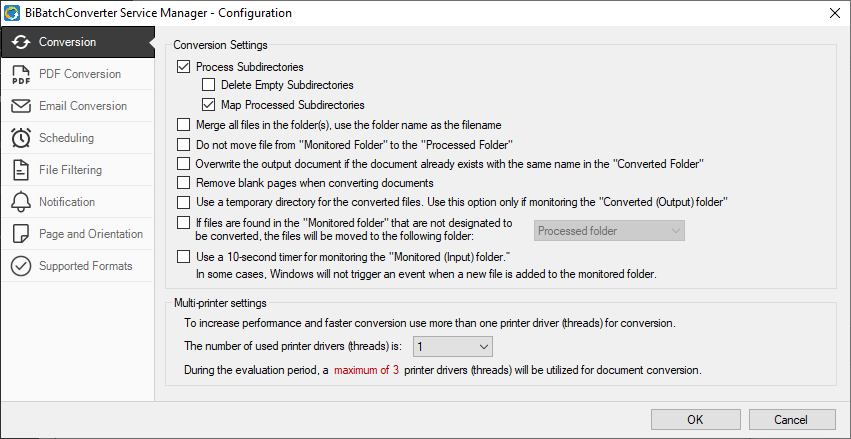 ) in the BiBatchConverter Service Manager. The Task Configuration window will appear, allowing the user to define folder paths and apply the desired conversion settings.
) in the BiBatchConverter Service Manager. The Task Configuration window will appear, allowing the user to define folder paths and apply the desired conversion settings.
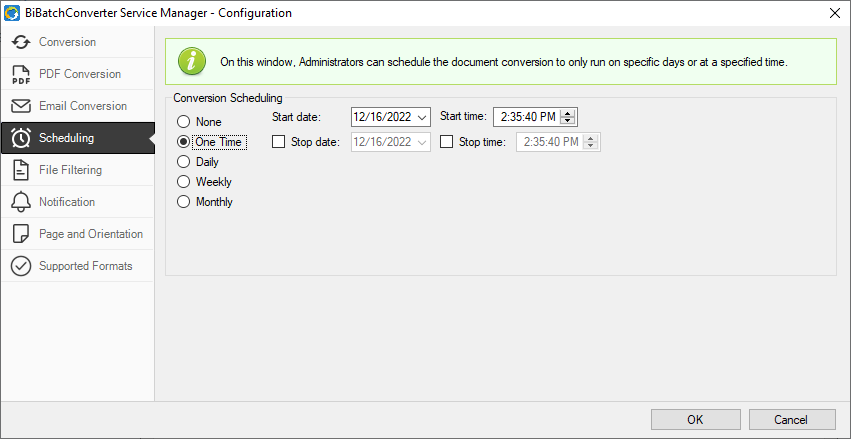
After completing the configuration, click the OK button in the Configuration window. BiBatchConverter will begin monitoring and converting files automatically. To pause or resume monitoring and conversion for a specific task, use the Start/Pause toggle button (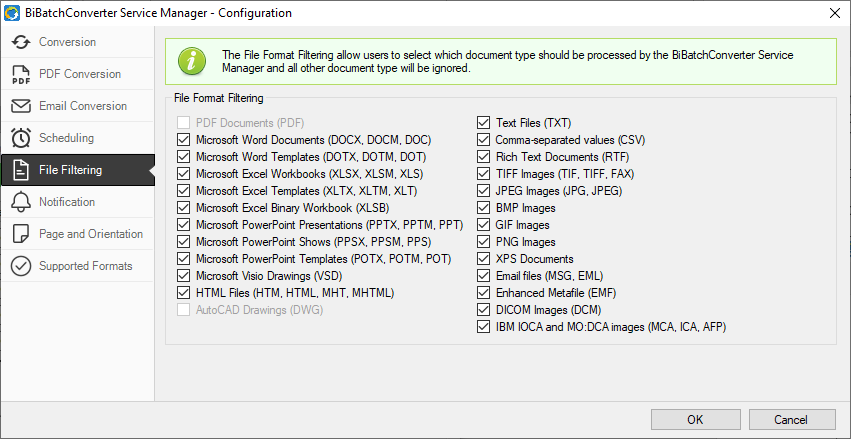 ).
).
To edit the configurations of an existing task, please click the Open Task Settings…(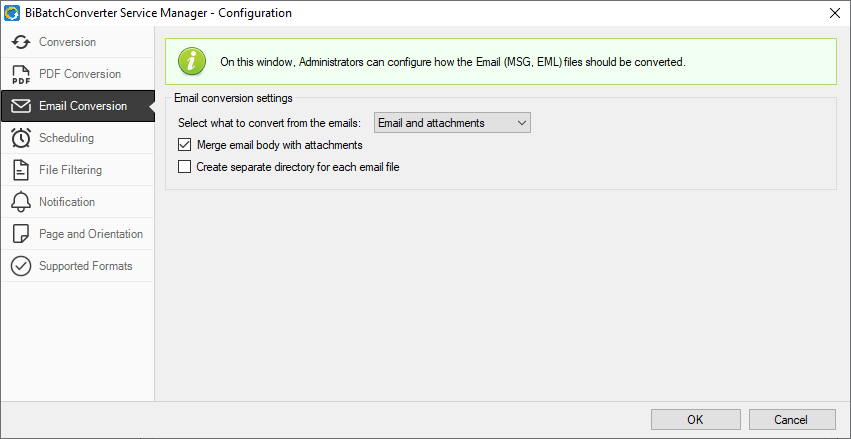 ) button that will open the Task Configuration window.
) button that will open the Task Configuration window.
Directory Monitoring
On the Directory Monitoring tab, the task name, monitored folders, and folder monitoring settings can be configured.
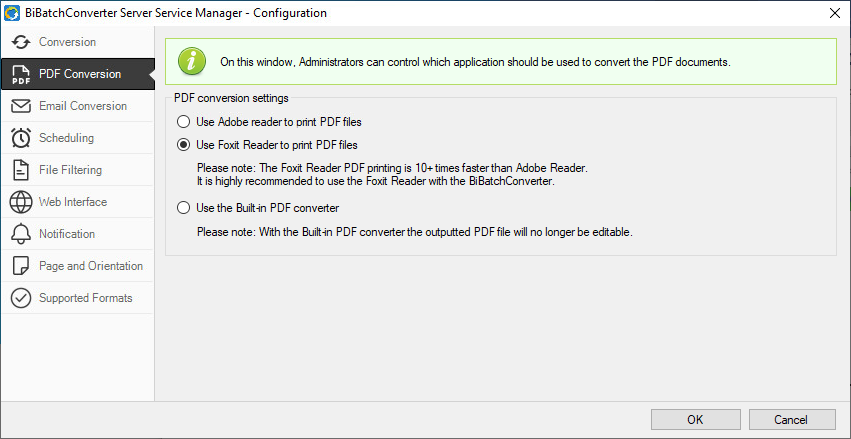
Account Name
Display Name: The name of the created task. The name cannot contain special characters or spaces, only letters, digits and dash (-) characters.
Monitored Folder Settings
The Monitored Folder Settings section allows users to configure the directories for input, output, processed, and failed documents during the conversion process.
Monitored (Input) Folder: The directory containing the documents to be converted. This folder is continuously monitored for new files that need conversion.
Converted (Output) Folder: The directory where successfully converted documents will be saved. If not configured, the converted documents will be automatically placed in the default output directory of the Printer Driver.
Processed Folder: The directory where original documents will be stored after being successfully processed and converted.
Failed Folder: The directory where files that cannot be converted will be moved, ensuring that failed conversions are kept separate for review and troubleshooting.
The BiBatchConverter Service supports using UNC paths (for example: \\MyServer\Documents\OutputFolder) and shared network folders, to let users access converted documents from the client computer through the network. To learn more, please see the Monitor Shared Network Directory using UNC Path section of the manual.
Folder Monitoring Settings
Process Subdirectories: The Process Subdirectories option enables the conversion of documents located in the subdirectories of the monitored directories.
Delete Empty Subdirectories: The Delete Empty Subdirectories option automatically deletes any empty subdirectories within the specified input directory after processing.
Map Processed Subdirectories: The Map Processed Subdirectories option mirrors the subdirectories and folder structure of the original monitored directories. It is particularly useful when there are multiple subdirectories or a categorized folder structure. If disabled, BiBatchConverter will convert every document and place them directly in the Output directory, without maintaining the original folder structure.
Conversion Settings
On the Conversion tab, the printer profile and document processing settings can be configured.
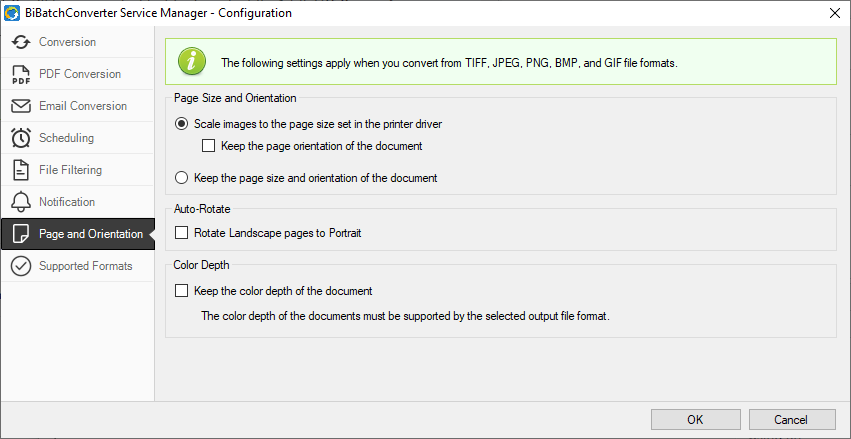
Select Printer Profile
Applies a predefined printer profile for document conversion. To modify the printer settings, click the Printing Preferences button and adjust the BiBatchConverter printer configuration as needed.
Merge all files in the folder(s), use the folder name as the filename
If enabled, every file in the monitored directory will be merged, and the filename of the merged output file will be the name of the folder.
For example:
If the folder name is "C:\Monitored\John-Doe\Case# 50-2023-DR-001805-XXXX-SB" the output file name will be "Case# 50-2023-DR-001805-XXXX-SB.PDF" if one is converting to PDF, or "Case# 50-2023-DR-001805-XXXX-SB.tif" if one is converting to TIFF.
If the output file already exists in the destination folder, the BiBatchConverter Service will append the new files to the existing document. If the output file does not exist, the BiBatchConverter Service will create the file automatically.
Do not move file from "Monitored Folder" to the "Processed Folder"
If enabled, successfully converted documents will be deleted from the source (Monitored) folder instead of being moved to the Processed Folder.
Overwrite output document if the document already exists with the same name in the "Converted Folder" If enabled, documents in the "Converted Folder" will be overwritten if they already exist with the same name.
Remove blank pages when converting documents
If enabled, the BiBatchConverter Service will remove blank pages from the converted document.
If the document being converted consists of a single blank page, no output file will be generated.
Use a temporary directory for the converted files
If enabled, the converted document will first be moved to the temporary directory. Once the conversion is complete, the document will be moved to the destination (Processed) directory. This option helps users track successfully converted documents, excluding the documents still under conversion.
If files are found in the "Monitored folder" that are not designated to be converted, the files will be moved to the following folder:
If enabled, files found in the "Monitored Folder" that are not designated for conversion will be moved to the folder selected from the dropdown menu next to this option.
PDF Converter Settings
Under the PDF Conversion tab, the application used for PDF conversion can be selected. The BiBatchConverter Service supports 32-bit Adobe Reader 10 or higher, 32-bit Adobe Acrobat Pro 10 or higher, and Foxit Reader 9.6 or higher.
By default, Adobe Reader or Foxit Reader option will be selected, depending on which application is installed on the computer. If both applications are available, Foxit Reader will be selected by default.
If Adobe Reader and Foxit Reader are not available, users can utilize the built-in PDF converter for PDF generation. Please note, by using the built-in PDF converter, the converted PDF document will no longer be editable.
The Use the Built-in PDF to Text converter option enables BiBatchConverter to extract text directly from PDF documents without relying on Adobe Reader or Foxit Reader. When the Use the Built-in PDF to Text converter option is selected, the BiBatchConverter Service bypasses the printer and all printer-related configuration settings. The generated output will always be a plain text file, regardless of the configured output format on the Conversion tab.
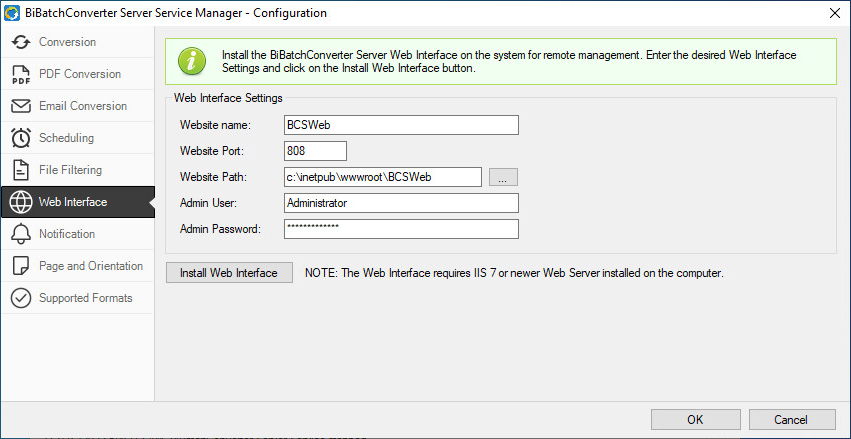
Email File Conversion Options
The Email Conversion tab, contains settings for printing email files with .MSG, and .EML extension.

Users can select which part of the email should be converted:
Scheduling
The Scheduling Settings define when the BiBatchConverter Service processes documents from the configured input directory.
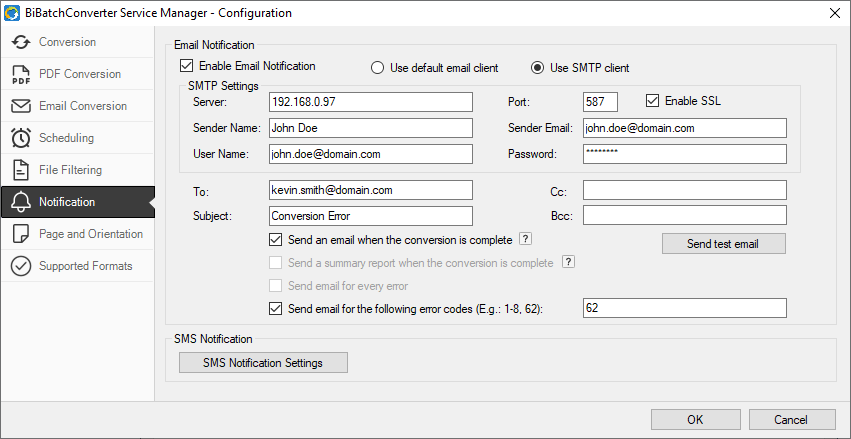
Always
If selected, scheduling is disabled and the service processes documents immediately as they appear in the input directory.
One Time
This option starts and stops the conversion at a specific date and time. No further documents will be processed until the scheduling configuration is changed.
Daily
Starts and stops the conversion at specified times every day.
Weekly
Starts and stops the conversion at specified times on selected day(s) of the week. Multiple days can be selected.
Monthly (Days)
Starts and stops the conversion at specified times on selected calendar days each month.
Monthly (Weeks)
Starts and stops the conversion based on selected weeks and days of the month.
File Format Filtering
Under the File Filtering tab, users and administrators can specify which document types should be processed by the BiBatchConverter Service Manager. Every other file type will be ignored.
For example:
If only the Microsoft Word Documents option is selected, the BiBatchConverter Service Manager will process only Microsoft Word files with the extensions .DOCX, .DOCM, and .DOC.
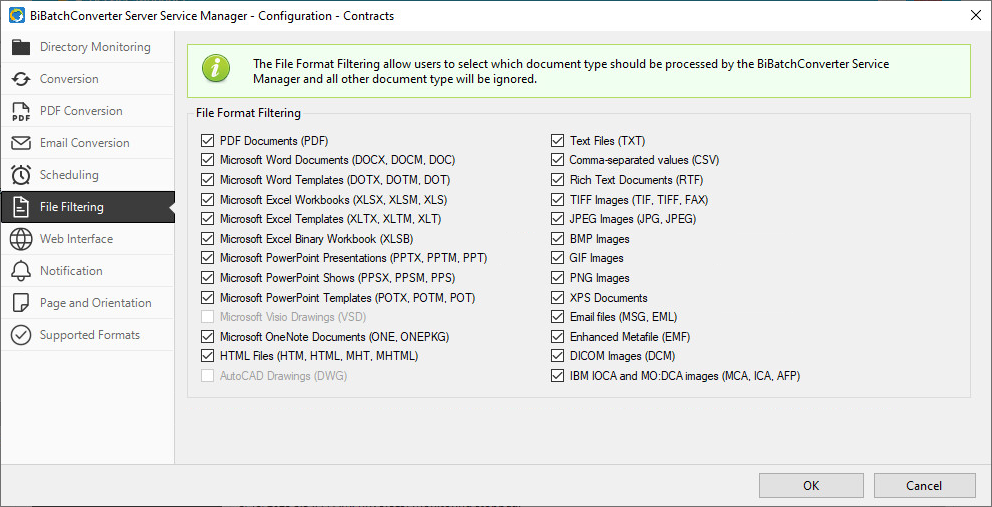
Installing the Web Interface
NOTE: Only available in the Server version of the BiBatchConverter.
To install the BiBatchConverter Server Web interface, please navigate to the BiBatchConverter Server Service Manager > Configuration > Web Interface tab.
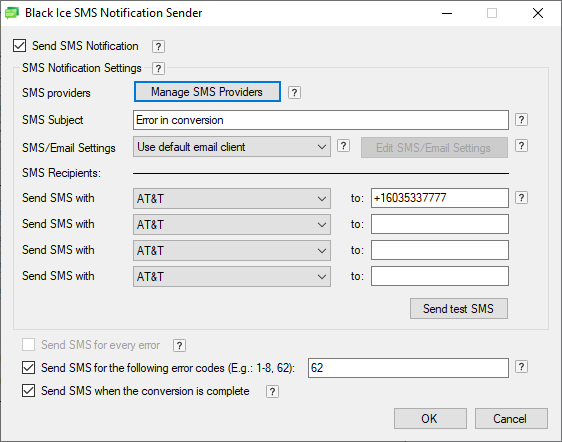
Once each field is filled, click on the Install Web Interface button.
To read more about the BiBatchConverter Server Web Interface, please refer to The BiBatchConverter Server Web Interface section of the online manual.
Email notifications
Email Notification covers settings to setup email notification sending if the conversion has finished, or the service has stopped. To enable the email notification feature, check the Enable Email Notification checkbox, and fill the required information.
To read more about Email notifications, please refer to the Email Notification section of the online manual.
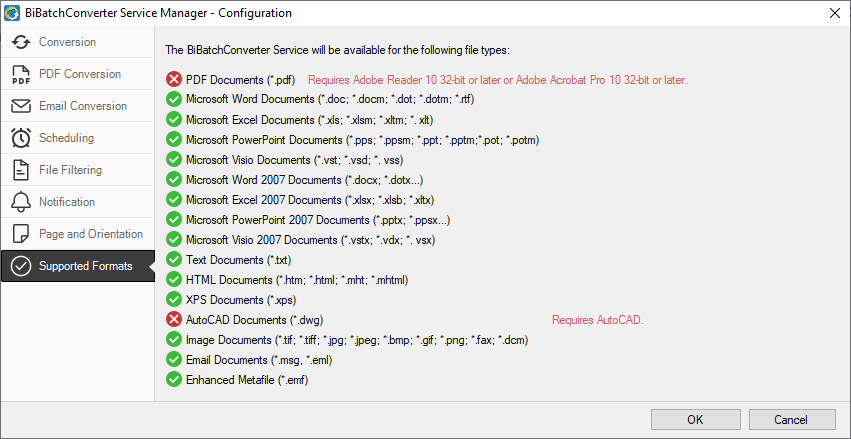
SMS notifications
The BiBatchConverter is able to send SMS notifications to users in several stages during the document conversion. To set up the SMS notification, navigate to the Configuration window > Notification tab and click on the SMS Notification Settings button.
To read more about SMS notifications, please refer to the SMS Notification Configuration section of the online manual.
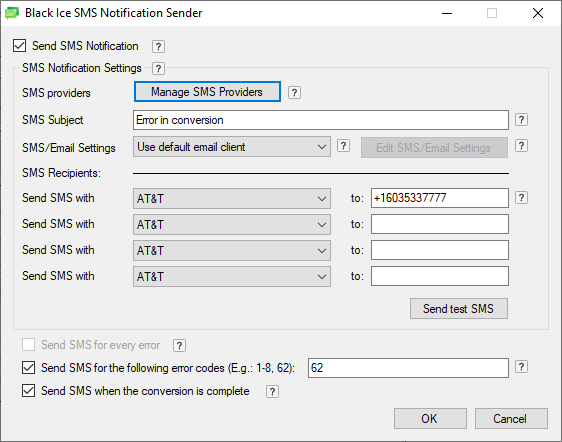
Page and Orientation
Under the Page and Orientation tab users and administrators can configure the BiBatchConverter Service to automatically detect the converted document image size and the page orientation.
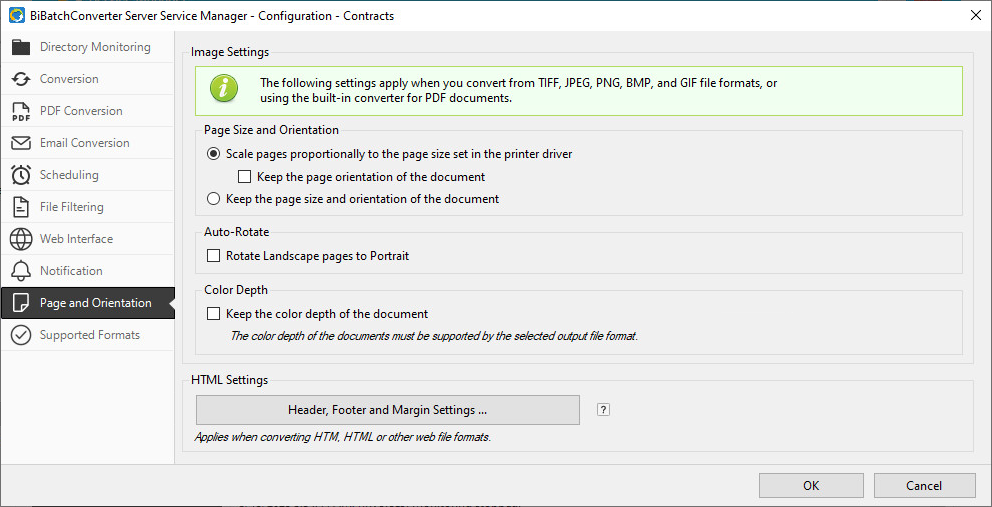
Scale images to the page size set in the printer driver
The page size of the output files will be the same as the page size set in the printer under Printing Preferences > Device Settings tab. If the converted document page size is different than the printer driver page size the document will be scaled to the printer driver page size.
Keep the page orientation of the document
If enabled, the original page orientation of the document will be preserved during conversion. The page size of the output file will follow the setting specified in the printer driver under Printing Preferences > Device Settings.
Keep the page size and orientation of the document
If enabled, the original document page size and orientation will be kept for the output document.
Rotate Landscape page to Portrait
If enabled, landscape pages in the converted document will be automatically rotated 90 degrees to fit portrait orientation.
Keep the color depth of the document (1-bit, 8-bit, or 24-bit)
If enabled, the original color depth of the document (1-bit, 8-bit, or 24-bit) will be preserved in the output file.
NOTE: The selected output file format must support the original color depth. For example; if a color 24-bit JPEG is converted and the output format is TIFF Group 4 is selected, the 24-bit JPEG will be converted to black and white 1-bit Tiff Group 4.
NOTE: Settings under the Image Conversion tab only apply to TIFF, JPEG, PNG, BMP, and GIF file formats.
Supported Formats
To review the detected applications for the supported file formats, navigate to Configuration > Supported Formats tab. The BiBatchConverter Service will be able to convert the file formats marked with green.
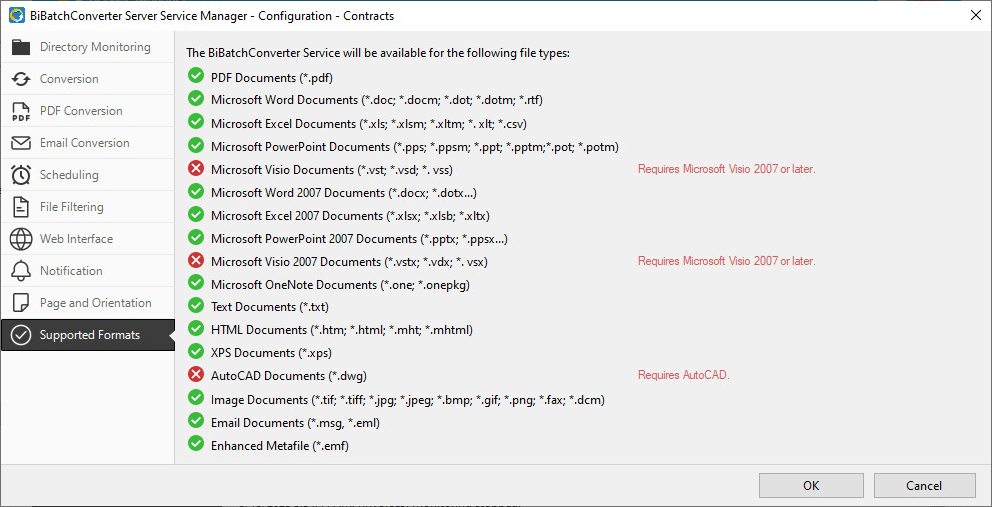
Starting the Conversion
Before starting the conversion, please make sure the BiBatchConverter Service is running. A green ribbon on the BiBatchConverter Service Manager user interface is indicating if the service is running.

If the service is not running, please select the Service Settings option on the BiBatchConverter Service Manager user interface and click on the Start Service button.
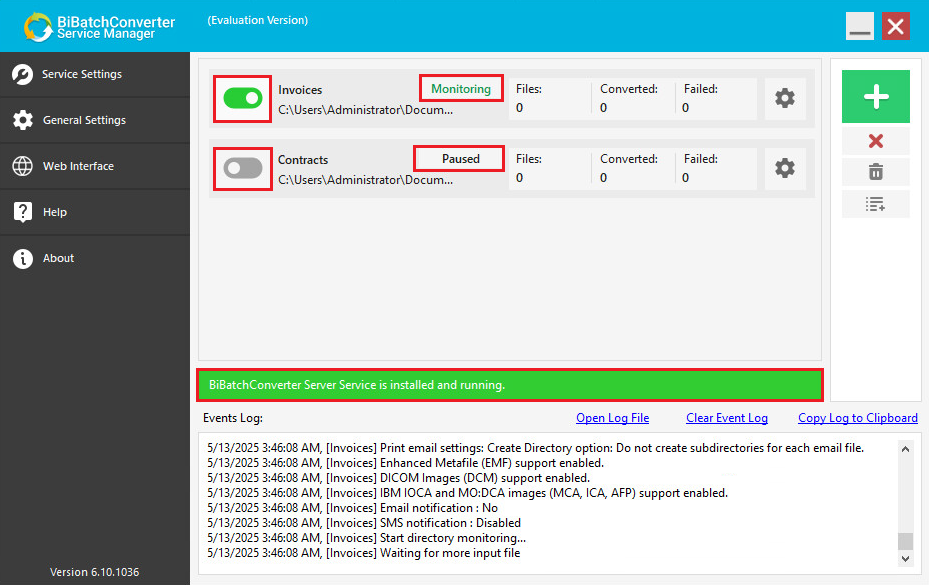
The BiBatchConverter Service will then start monitoring the input directory and processing the files. To ensure that folder monitoring and conversion are active, verify that the desired tasks are running in the BiBatchConverter Service Manager user interface.
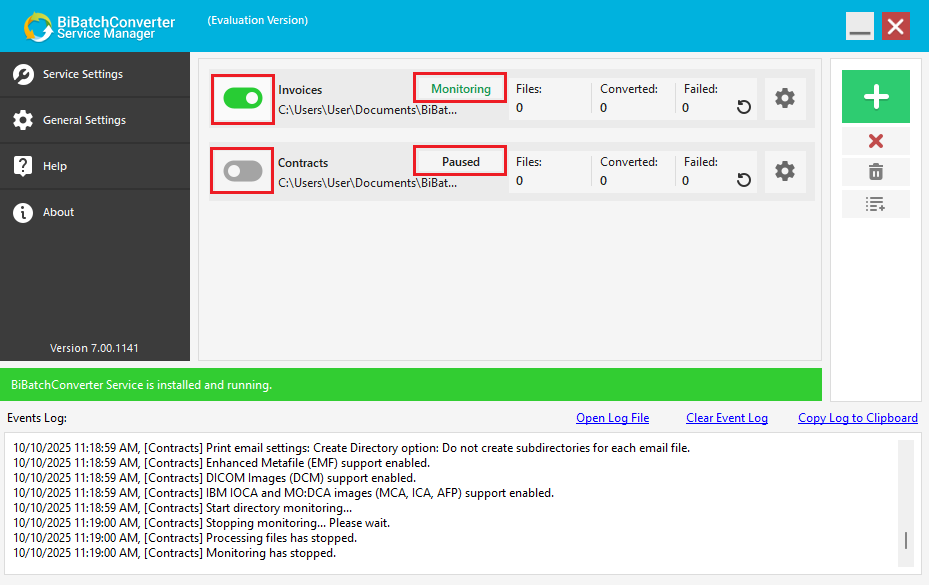
- File Descriptions (Title, Author, Subject, Keywords)
- Encryption and Password handling
- Open PDF Settings
- Font embedding and subsetting
- Compression and Resampling
- Linear PDF (Fast Web View)
- You may select from a list of common paper sizes, or create your own custom paper size using the advanced paper size option.
- When using the “Force Fax Resolution” feature, you can assure that the output of the printer driver will be in a fax friendly resolution. 204X98 is used for standard resolution, and 204X196 is used for fine resolution.
- You may set the orientation of the printed document to either Landscape or Portrait. "Rotate Landscape to Portrait" option will output a document in landscape format and fit it to Portrait orientation.
- You can configure the graphic resolution of the outputted image. A higher resolution means the document will be more detailed and readable, but may result in a longer printing time.
Key features of the BiBatchConverter
Multi-driver Parallel Conversion
The BiBatchConverter can utilize multiple Black Ice Printer Drivers for parallel multi-threaded document conversion!
To make sure that the conversion process is running in the optimal environment, it is required to have at least one CPU core per Printer Driver. For example: When converting with three Black Ice Printer Drivers parallel, the minimum of 4 CPU core system is needed. One core for the Operating System and 3 cores for conversion for the 3 printer drivers.
Batch Conversion and Directory Monitoring
The BiBatchConverter Service Manager can monitor multiple directories and their subdirectories simultaneously, automatically converting every document added to them. Each monitored directory is managed by a separate Task with its own configuration, enabling unique input and output settings, conversion profiles, and scheduling options. Tasks can run continuously or at specific times, providing flexible and automated document conversion.
Batch Convert Files from OneDrive, Dropbox, or Google Drive
The BiBatchConverter offers a solution to monitor cloud directories on OneDrive, Google Drive, or Dropbox and move the processed documents to another directory.
The BiBatchConverter can monitor cloud directories and convert/batch convert documents to PDF, TIFF, FAX, JPEG, PNG, and many more file formats.
Batch Conversion Scheduling
The BiBatchConverter Service Manager features scheduled directory monitoring, which gives the user the ability to select when the BiBatchConverter Service Manager should start monitoring the specified directories. With scheduling, the user may select what days and hour to start monitoring a directory and the end time to finish monitoring the directory.
Email converted documents
The BiBatchConverter has a built-in feature to email converted files right after the conversion. If email sending is enabled under the Filename Generation tab of the Printing Preferences, a send email dialog comes up after each print job where the recipients can be entered. Emails can also be sent silently and to predefined recipients.
Web Interface for Remote Management
The BiBatchConverter Service includes a Web Interface, allowing Administrators to monitor and configure the document conversion process on the go from any device including smartphones and tablets.
Batch Convert FAX & TIFF Files to OCR searchable PDF files
The Searchable Compact PDF file format allows users to generate searchable PDF files from non-searchable documents (Image PDF, TIFF, or other image-based documents). In addition to searchability, in searchable PDF files, the text can be selected and copied from the generated PDF document.
File Name Flexibility
When it comes to naming the files that you convert, BiBatchConverter gives you a number of options. BiBatchConverter can be configured to name every converted file using a specified prefix and extension. It can also be set to use the original document name, or a custom name of your choosing. If you are not comfortable with files being automatically generated, BiBatchConverter gives you the option to manually specify the name and output directory of every converted file.
Conversion Profiles Manager
The built in Profile Manager allows users to select and save the printer settings as a profile. The user can save several printer settings to a profile, and then simply select the profile without having to manually change the settings every time.
Extracting Text
The BiBatchConverter is capable of extracting the text information from the printed document. The text extracted from the document is saved as a standard text file. The text file will have the same name as the printed document, but with the .txt extension. The BiBatchConverter supports the following text outputs:
- Plain text (default) – this option will generate plain text outputs without formatting, positioning and font information.
- Add font information, position and style – This option will generate text outputs with font information, positioning and style. This option is recommended if intending to convert the text back to a formatted document.
- Text with layout – This option will generate plain text outputs without font information while keeping the original physical layout, indent, alignment and spacing.
Rotate documents Counter-Clockwise
The BiBatchConverter includes the capability to Rotate documents 90°, 180° and 270° degrees Counter-Clockwise or rotate Landscape documents to Portrait orientation. This is beneficial when needing to programmatically rotate improperly oriented or scanned documents
Remove blank pages
The BiBatchConverter has a built-in feature to remove blank pages from the printed document.
Annotation/Header/Footer Printing
The BiBatchConverter includes the capability to add Annotations, Headers and Footers to the printed document to provide important background information and to make your document look more professional.
PDF Specific Features
The BiBatchConverter includes advanced features to print PDF documents, such as:
For more information please see the PDF Specific Features.
Convert any printable file into an image file
With BiBatchConverter, you can take any document, such as a Word document, Excel spreadsheet, PowerPoint presentation, or webpage, and turn it into an image file. BiBatchConverter supports virtually any type of image, including TIFF, JPEG, PDF, and PNG.
Multiple printing options
The BiBatchConverter installs a virtual printer on your computer. This allows you to print your document directly to the BiBatchConverter printer and output the image file to a directory of your choice. You can also use the BiBatchConverter’s friendly user interface to find and convert documents manually. You may even have the BiBatchConverter automatically print documents in specified directories.
Compact Mode
When set to compact mode, the BiBatchConverter becomes a small icon in the bottom right corner of your screen. To convert documents, simply drag them into the window. The BiBatchConverter can be set to start in compact mode. Additionally, you can set it to start automatically when you turn on your computer.
Event Logging
The BiBatchConverter keeps track of every successful and unsuccessful conversion and stores them into an event window. Any problems that occur during the conversion are documented in the window for troubleshooting. These events can be saved to a file for later reference or cleared as needed.
Formatting Options
The BiBatchConverter gives you a number of formatting options depending on the type of image you are converting to. These options include compression, color depth, and general photo quality of the converted image.
Multipage Images
Certain image types, such as PDF and TIFF, support multipage images. You can set the BiBatchConverter to generate one multipage image, or have it generate a separate file for each page.
Bates Numbering
The BiBatchConverter allows you to use bates numbering to number each page of a multipage document. Bates numbering usually consists of a string of letters followed by a number that increments up on each page. You can choose which number to start with as well as the position of the number on each page. The BiBatchConverter will also save each Bates numbering format you configure, allowing you to quickly select from previous formats rather than configuring the same one over and over again.
Watermark or Stamp
With the BiBatchConverter, you can add watermarks or stamps to any converted document, such as a company logo or signature. You may configure the position of the watermark or stamp on the page as well as the brightness. Multipage documents may be configured to have different watermarks or stamps on certain pages, or have the same appear on every page.
Annotations
The BiBatchConverter allows you to add custom annotations to each printed page. If the date and time is included in the annotation text, the BiBatchConverter will automatically update it at printing time (with the time of the print job). The font, as well as the position of the annotation on the page, can be fully customized. You may also choose to have the annotation be transparent or opaque.
Converter Configuration
If you are printing to a physical printer, the BiBatchConverter will allow you to control the output like any standard printer.
Use Printer Settings
You may want the BiBatchConverter to have the same configuration as another printer already on your system. The “User Printer Settings” feature allows for the BiBatchConverter to automatically configure the print job using the same settings as the selected printer. After printing if you wish to restore the previous settings, use the "Restore Default BiBatchConverter" option.
Printing Email files and Attachments
BiBatchConverter is capable to print emails files with the following print modes: Email body and attachment, Email body only, Email attachment only
The BiBatchConverter is also capable to merge the email body and every attachments of an email file into one single output document, and to create directory for each email file, where the folder name will be the name of the email file, and the converted email body and attachments will be placed into this folder.
Upload documents to Web
The Black Ice Printer Drivers have a built-in feature to upload converted files instantly to a website using HTTPS/HTTP. This feature is available from version 14.77 an on in every Printer Driver.
In order to upload converted documents to a web server, one will need a webpage which receives and saves the uploaded documents to the web server. For example solutions, please refer to the Configuring Webpage (PHP) and Configuring Webpage (ASP.NET) pages.
The HTTP Upload feature sends the converted documents to the specified web address with POST requests, which is the most common solution to upload documents to a website.
Content Based File Naming (Use filename from page content)
By using the "Use filename from page content" feature, the file name of the created output file can be specified. To specify the file name add the Filename tag to the first page of the document.
Check System for Requirements
Certain programs need to be installed to take advantage of BiBatchConverter’s functionality. For example, if you do not have Microsoft Word installed on your computer, you will not be able to convert Word documents. BiBatchConverter can check your system and tell you what types of files you can and cannot convert based on what programs you have installed.
BiBatchConverter can convert the following file types:
| File Format | Extension |
| Adobe Reader, Foxit Reader | |
| Microsoft Word | .doc, .docx, .docm, .dot, .dotx |
| Microsoft Excel | .xls, .xlsx, .xlsm, .xlsb |
| Microsoft PowerPoint | .ppt, .pptx, .pps, .ppsx, .ppsm, .pptm |
| Microsoft Publisher | .pub |
| Image formats | .png, .jpg, .jpeg, .gif, .bmp, .dcm |
| Tagged Interchange File Format | .tiff (fax compatible formats too) |
| Microsoft text files | .txt, .rtf |
| Comma-Separated Variables | .csv |
| XML Paper Specification | .xps |
| Autocad | .dwg |
| Hypertext Markup Language | .htm, .html |
| Email files | .msg, .eml |
| EMF files | .emf |
| And More... | |
Supported Output Formats
- End-User
- Windows/Citrix Server
Pricing
BiBatchConverter is an annual subscription. A single license is valid for a single PC on Windows 11/10 operating systems for one year. For multiple users on the same PC, no additional licenses are required. For installations on different PCs, you will need enough licenses to cover the total number of PCs.*
Black Ice Software offer different licensing models for corporate users and End Users. For more information, please visit the What license do I need? page.
BiBatchConverter Server is also an annual subscription licensed per Server on Windows Terminal Server and Citrix environments. Please see the BiBatchConverter Server pricing.
| Licenses | Subscription Price |
| Single License | $199.99 |
| 5 Licenses | $399.99 |
| 10 Licenses | $499.99 |
| 25 Licenses | $899.99 |
| 50 Licenses | $1,799.99 |
| 100 Licenses | $3,599.99 |
| Corporate License | Please Call |
| Multiple CPUs - Multiple CPU licenses are capable to install multiple numbers of printers on the single system for parallel printing. | |
| Single License and 2 CPU core | $849.99 |
| Single License and 3 CPU core | $1049.99 |
| Single License and 4 CPU core | $1299.99 |
| Single License and 5 CPU core | $1499.99 |
| Server Licenses | Subscription Price |
| Single Server License | $499.99 |
| Single License and 2 CPU core | $849.99 |
| Single License and 3 CPU core | $1,049.99 |
| Single License and 4 CPU core | $1,299.99 |
| Single License and 5 CPU core | $1,499.99 |
| Multiple CPUs - Multiple CPU licenses are capable to install multiple numbers of printers on the single system for parallel printing. | |
* Prices subject to change without notice
Black Ice Software, LLC
950 Peninsula Corp Circle Suite 2017
Boca Raton, FL 33487
Tel: 561-757-4107
Fax: 561-757-4109
E-Mail: sales@blackice.com
- Upgrade the BiBatchConverter without reboot while preserving the user settings using the MSI installer
- Automatic silent installation
- Automatic register/activate the Printer driver with a serial number
- Install the Printer driver for evaluation.
- Configure installation target directory.
- Configure the registration of the printer driver with Black Ice license server:
- 443 port with SSL (default)
- 80 port without SSL
- 3500 port without SSL
- 15000 port without SSL
- Configure the connection to license server with proxy server.
- Not using proxy server (default)
- Attempt to discover automatic proxy
- Use HTTP proxy
- Use SOCKS proxy
- Configure the default printer.
- Keep the user current Default Printer (default).
- Set Printer Driver to be the Default Printer for current user only.
- Set Printer Driver to be the Default Printer for every users
- Pre-configure the printer driver using the configuration ini file.
- Such as file format, output directory
- Email configuration of email provider, SMTP setting, User name, Password, Recipients, Subject, Email Body and Silent Email sending.
- SharePoint Upload configuration of login information, upload directory, HTTPS connection and silent uploading.
- FTP upload configuration of login information, SSL configuration, destination directory, proxy settings and more.
- Every feature of the printer driver can be pre-configured.
- Use Profile file to Configuration the printer.
- Hide Printer driver Printing Preferences Tab(s) from Users.
- Hide the Upload and Email Options from Users on the Printer driver Printing Preferences.
- Assign to Computer (silent install)
- Assign to User (silent install)
- Publish
- Installation from command line (cmd.exe)
- .NET framework 4.0 or higher
MSI Installer for large scale deployment
The MSI installer for BiBatchConverter designed for large scale deployment in Active Directory environments. With the BiBatchConverter MSI installer System Administrators can create custom configurations for every User on the system and register or activate the BiBatchConverter. The MSI installer will greatly simplify mess deployment and eliminates the need for customers to build custom installations.
The MSI installer is compatible with Microsoft SMS/SCCM, Zenworks, and Marimba.
The MSI install has the following installation features:
Please contact sales for more technical details on the MSI installer at sales@blackice.com.
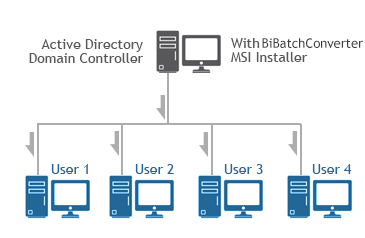
Supported Installation methods using Group Policy Deployment;
Additional supported installation method;
Installing Black Ice products on Azure Windows Virtual Desktop
Hyper-V is supported.
Requirement;
For MSI Installer availability, contact sales@blackice.com.

